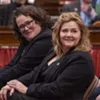The House of Representatives voted 91-42 to accept the November election of Rep. Jonathan Cooper (D-Pownal) as valid, rejecting a challenge brought by his Republican opponent, Bruce Busa.
Busa lost by just 23 votes, but after the election, it emerged that as many as 56 voters in the district received ballots listing the wrong House candidates.
Instead of having the chance to vote for the candidates in the Bennington-1 district — which includes the small towns of Pownal, Readsboro, Searsburg, Woodford and Stamford — dozens of Pownal voters received ballots listing candidates in the neighboring Bennington-5 district.
The error occurred following a 2022 redistricting. It appears Pownal town officials improperly accounted for a new line that divides the two districts.
The House decision was not a surprise, as it followed an earlier committee vote that was nearly unanimous.
Secretary of State Backtracks on Bennington Election Revote

Secretary of State Backtracks on Bennington Election Revote
By Kevin McCallum
News
But it nevertheless stirred up significant partisan squabbling on Friday, with Democrats looking to defend the decision and many Republicans crying foul.
“What message are we sending to candidates and voters? Are we saying that uncounted votes don’t matter?” Rep. Chris Keyser (R-Bennington) asked.
Rep. Casey Toof (R-St. Albans Town) said he didn’t think democracy had been served.
“I feel like some people were left out of the election decision and that’s just not OK with me,” Toof said. “I think we owe it to the people to get this right.”
Busa lambasted the decision as defying the will of the voters. In a statement, he called it “just another step progressing toward the total destruction of democracy in the failed state of Vermont.”
Secretary of State Sarah Copeland Hanzas, a Democrat, initially called for a revote shortly after the election, but backtracked after the complications involved in a revote became apparent.
Rep. Matt Birong (D-Vergennes), chair of the House Government and Military Affairs Committee, said there was no historical precedent for the House to overturn an election result.
Detailed testimony taken over several weeks helped the committee conclude that holding a new election would likely disenfranchise even more voters than the November election. That’s because the turnout for a special election would certainly be far lower than one held at the same time as a presidential election. About 2,500 people voted in November in the Bennington-1 district.
“It was apparent that a revote could not recreate the time and context of the initial election,” Birong told his colleagues on Friday.
The cost and logistics of holding a new election also came up during the committee discussion, including the fact that a new election likely couldn’t be completed before the end of this year’s legislative session.
Birong said his committee intended to pass a bill later this session aimed at preventing such mistakes from happening again, including a review of all voter rolls in the state.
An earlier court challenge by Busa was rejected, as the Vermont Constitution gives the House and Senate alone the right to say whether their members were fairly elected and whether they are qualified.
Rep. Michael Nigro (D-Bennington) acknowledged lawmakers faced an “imperfect choice,” but said they needed to pick the one that best reflected the will of the voters.
Dismissing the votes of 2,500 people to cure the harm done to 56 and then holding a new election with a far lower turnout would “hardly feel like an improved execution of democracy,” he said.
